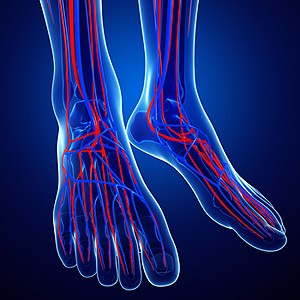Flint Office
1303 S. Linden Rd., Suite D
Flint, MI 48532

Common symptoms of poor circulation are tingling sensations in the feet after sitting for long periods or if exposed to cold elements. There may be existing medical conditions that can cause poor circulation. High blood pressure can be a common reason, as it could represent limited blood flow to the organs. People who smoke may be prone to developing poor circulation, and the effects are often felt in the lower legs and feet. Poor circulation may also happen from having endured a foot injury, which may constrict blood flow. It is important for patients who lead a sedentary lifestyle to move around as much as possible. Engaging in a gentle exercise program is an effective way to accomplish this, and can provide adequate circulation to the body. If you would like additional knowledge about how poor circulation can affect the feet, it is suggested that you confer with a podiatrist.
Poor circulation is a serious condition and needs immediate medical attention. If you have any concerns with poor circulation in your feet contact one of our podiatrists of Community Podiatry Group. Our doctors will treat your foot and ankle needs.
Poor Circulation in the Feet
Poor blood circulation in the feet and legs is can be caused by peripheral artery disease (PAD), which is the result of a buildup of plaque in the arteries.
Plaque buildup or atherosclerosis results from excess calcium and cholesterol in the bloodstream. This can restrict the amount of blood which can flow through the arteries. Poor blood circulation in the feet and legs are sometimes caused by inflammation in the blood vessels, known as vasculitis.
Causes
Lack of oxygen and oxygen from poor blood circulation restricts muscle growth and development. It can also cause:
Those who have diabetes or smoke are at greatest risk for poor circulation, as are those who are over 50. If you have poor circulation in the feet and legs it may be caused by PAD and is important to make changes to your lifestyle in order to reduce risk of getting a heart attack or stroke. Exercise and maintaining a healthy lifestyle will dramatically improve conditions.
As always, see a podiatrist as he or she will assist in finding a regimen that suits you. A podiatrist can also prescribe you any needed medication.
If you have any questions please feel free to contact our office located in Flint, MI . We offer the newest diagnostic and treatment technologies for all your foot and ankle needs.